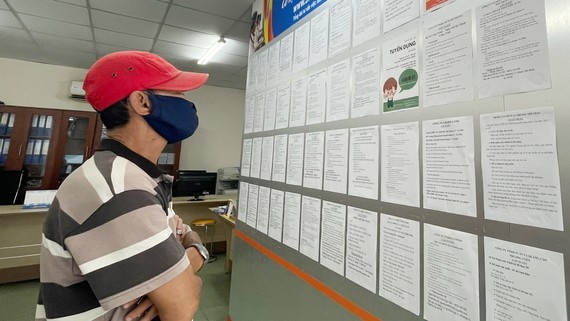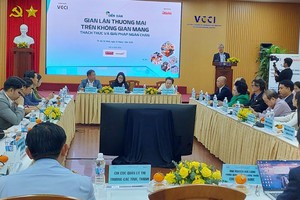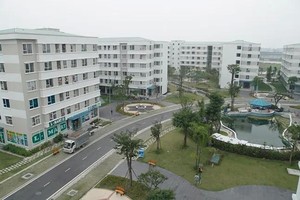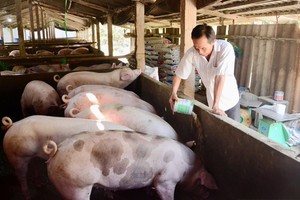 Workers seek jobs at HCMC Youth Employment Service Center. (Photo: SGGP)
Workers seek jobs at HCMC Youth Employment Service Center. (Photo: SGGP)
Recruiting thousands of people at once
At present, Cholimex Company needs to recruit 1,000 food processing workers with a salary of VND6 million-VND11 million per person per month with many benefits, including meal allowance, productivity bonus, child care allowance, and tourism. Some enterprises in the garments, food processing, and electronic assembly industries also want to recruit from 200 to 1,500 unskilled workers. Specifically, Freetrend Industrial Vietnam Company recruits 1,500 workers, Yujin Vina Company hires 1,000, both Nidec Tosok Vietnam Company and Nobland Vietnam Company need to employ 700.
According to the HCMC Employment Service Center, many enterprises need to enroll a large number of workers, with a salary of VND8 million-VND15 million per person per month. Ms. Le Thi Kieu Phuong, Director of the HCMC Employment Service Center, said that the center updated daily information of job seekers and jobs. Moreover, the center organized an online job exchange every 15 days. Especially, to support job connections, the center organized connections between employers and job seekers on Zalo. By scanning the QR codes, job seekers and recruiters will capture each other's information and needs.
In the mid-level and senior labor market, Bosch Vietnam Company needs to recruit IT engineers with multi-platform development experience, solid skills, and good command of English. Besides salary, Bosch offers a 13th-month bonus, year-round bonuses, and a premium health insurance package for employees and their loved ones. Meanwhile, NEC Vietnam Company is recruiting engineers with logical thinking, the ability to work under high pressure, and teamwork skills. NEC proffers a 15th-month bonus, international premium healthcare insurance, 19 days of paid leave, and a special allowance for foreign language certificates ($500 per person per month).
Many other businesses also hire high-quality workers, mid-level and senior workers with the ability to work with colleagues worldwide and ethical and standard behavior. A representative of Navigos Company informed that nearly 57 percent of enterprises participating in the survey said that they would recruit workers immediately after returning to normal operation. Especially, 50 percent of businesses would recruit new employees. This is a remarkable point for employers and also a valuable opportunity for people who are looking for work.
More than 1.3 million workers have returned to work
Mr. Le Minh Tan, Director of the HCMC Department of Labor, Invalids, and Social Affairs, informed that according to incomplete reports from districts and Thu Duc city, more than 1.3 million workers had returned to work. In export processing zones, industrial and high-tech parks alone, so far, 1,430 enterprises have resumed operations, accounting for 95 percent, with nearly 257,000 employees, accounting for 76 percent. However, enterprises with a large number of employees have not yet operated at full capacity. They have resumed production with only 50-80 percent of the total number of employees to ensure safety against Covid-19, as well as to limit the spread of the pandemic if there are Covid-19 cases. "Enterprises in the fields of industrial processing and manufacturing need to recruit workers all year round to meet operational capacity and replace and supplement laid-off employees," Mr. Le Minh Tan talked about job opportunities in the near future.
According to statistics, from now until the end of the year, the city needs about 57,000 workers. The group of business and commerce offers about 13,000 jobs, accounting for 23 percent; personal service and security need about 6,500 workers, accounting for 12 percent; information technology needs about 4,300 workers, accounting for 7.5 percent; mechanical engineering and automation provide about 2,800 jobs, accounting for 5 percent; transporting, warehousing, and port services give about 2,700 jobs, accounting for nearly 5 percent.
Faced with this need, the HCMC Department of Labor, Invalids, and Social Affairs coordinated with the HCMC Export Processing Zone and Industrial Park Authority, and the Management Board of the Saigon Hi-Tech Parks to grasp the labor demand of enterprises. At the same time, the department directed the HCMC Employment Service Center together with the HCMC Youth Employment Service Center to carry out activities to connect labor supply and demand. The focus is on finding labor resources through coordination with Mekong Delta provinces to join online job exchanges. This activity aims to help workers to participate in direct interviews with enterprises in HCMC. The department also collaborated with districts to make a list of people who had lost their jobs during social distancing to provide job counseling and introduction and recommendation about accommodation for workers from other provinces when they look for jobs. Especially, HCMC creates favorable conditions to bring workers back to the city to live and work.
At present, Cholimex Company needs to recruit 1,000 food processing workers with a salary of VND6 million-VND11 million per person per month with many benefits, including meal allowance, productivity bonus, child care allowance, and tourism. Some enterprises in the garments, food processing, and electronic assembly industries also want to recruit from 200 to 1,500 unskilled workers. Specifically, Freetrend Industrial Vietnam Company recruits 1,500 workers, Yujin Vina Company hires 1,000, both Nidec Tosok Vietnam Company and Nobland Vietnam Company need to employ 700.
According to the HCMC Employment Service Center, many enterprises need to enroll a large number of workers, with a salary of VND8 million-VND15 million per person per month. Ms. Le Thi Kieu Phuong, Director of the HCMC Employment Service Center, said that the center updated daily information of job seekers and jobs. Moreover, the center organized an online job exchange every 15 days. Especially, to support job connections, the center organized connections between employers and job seekers on Zalo. By scanning the QR codes, job seekers and recruiters will capture each other's information and needs.
In the mid-level and senior labor market, Bosch Vietnam Company needs to recruit IT engineers with multi-platform development experience, solid skills, and good command of English. Besides salary, Bosch offers a 13th-month bonus, year-round bonuses, and a premium health insurance package for employees and their loved ones. Meanwhile, NEC Vietnam Company is recruiting engineers with logical thinking, the ability to work under high pressure, and teamwork skills. NEC proffers a 15th-month bonus, international premium healthcare insurance, 19 days of paid leave, and a special allowance for foreign language certificates ($500 per person per month).
Many other businesses also hire high-quality workers, mid-level and senior workers with the ability to work with colleagues worldwide and ethical and standard behavior. A representative of Navigos Company informed that nearly 57 percent of enterprises participating in the survey said that they would recruit workers immediately after returning to normal operation. Especially, 50 percent of businesses would recruit new employees. This is a remarkable point for employers and also a valuable opportunity for people who are looking for work.
More than 1.3 million workers have returned to work
Mr. Le Minh Tan, Director of the HCMC Department of Labor, Invalids, and Social Affairs, informed that according to incomplete reports from districts and Thu Duc city, more than 1.3 million workers had returned to work. In export processing zones, industrial and high-tech parks alone, so far, 1,430 enterprises have resumed operations, accounting for 95 percent, with nearly 257,000 employees, accounting for 76 percent. However, enterprises with a large number of employees have not yet operated at full capacity. They have resumed production with only 50-80 percent of the total number of employees to ensure safety against Covid-19, as well as to limit the spread of the pandemic if there are Covid-19 cases. "Enterprises in the fields of industrial processing and manufacturing need to recruit workers all year round to meet operational capacity and replace and supplement laid-off employees," Mr. Le Minh Tan talked about job opportunities in the near future.
According to statistics, from now until the end of the year, the city needs about 57,000 workers. The group of business and commerce offers about 13,000 jobs, accounting for 23 percent; personal service and security need about 6,500 workers, accounting for 12 percent; information technology needs about 4,300 workers, accounting for 7.5 percent; mechanical engineering and automation provide about 2,800 jobs, accounting for 5 percent; transporting, warehousing, and port services give about 2,700 jobs, accounting for nearly 5 percent.
Faced with this need, the HCMC Department of Labor, Invalids, and Social Affairs coordinated with the HCMC Export Processing Zone and Industrial Park Authority, and the Management Board of the Saigon Hi-Tech Parks to grasp the labor demand of enterprises. At the same time, the department directed the HCMC Employment Service Center together with the HCMC Youth Employment Service Center to carry out activities to connect labor supply and demand. The focus is on finding labor resources through coordination with Mekong Delta provinces to join online job exchanges. This activity aims to help workers to participate in direct interviews with enterprises in HCMC. The department also collaborated with districts to make a list of people who had lost their jobs during social distancing to provide job counseling and introduction and recommendation about accommodation for workers from other provinces when they look for jobs. Especially, HCMC creates favorable conditions to bring workers back to the city to live and work.
Dr. Tran Quang Thang, Director of the Institute of Economics and Management of HCMC: Promoting the attraction of skilled workers
Out-of-province workers include those working in FDI and large enterprises, with relatively stable incomes (an average of over $6,000 per year) and stable accommodation. Most of them have already settled. Meanwhile, most freelance workers do not have social insurance and live in temporary, cramped boarding houses. Their lives are quite difficult.
The pandemic has revealed many problems that require us to be more resolute. HCMC needs to build data on workers in the city, especially out-of-province workers in the city. From there, the city will have an orientation to train them to become technical and professional workers. The city needs to promote social housing projects to gradually replace shanty boarding houses, ensuring a safe living environment for workers. Especially, the city is building a smart city, developing the digital economy, and applying science and high technology. Therefore, the Government in general and HCMC, in particular, need a program to restructure the workforce, aiming at attracting skilled and professional workers, meeting the development demand of the city.
Master Tran Anh Tuan, HCMC Institute for Human Resource Training and Development: Many opportunities for trained workers
After the Covid-19 pandemic, many enterprises in HCMC face a labor shortage of 30 percent, even up to 60 percent, especially laborers, direct production workers, and labor-intensive industries. Currently, the city needs 90 percent of trained workers. Especially, enterprises are in dire need of trained and high-quality workers with outstanding skills and actual abilities.
With those factors, the labor market will have great changes, increasing job opportunities for trained workers. The occupations that use a lot of laborers and low-skilled workers will gradually lose their competitive advantage. A part of the low-skilled workforce will be eliminated and replaced by skilled workers with good working attitudes. Therefore, laborers need to actively equip themselves with professional knowledge and skills and the right attitudes. HCMC also needs to improve the quality of human resources associated with the labor market, rapidly increasing trained workers. At the same time, it should perfect the information system and improve the quality of labor market forecasts to provide information on job opportunities, job vacancies, and training courses to help laborers access suitable jobs.
Out-of-province workers include those working in FDI and large enterprises, with relatively stable incomes (an average of over $6,000 per year) and stable accommodation. Most of them have already settled. Meanwhile, most freelance workers do not have social insurance and live in temporary, cramped boarding houses. Their lives are quite difficult.
The pandemic has revealed many problems that require us to be more resolute. HCMC needs to build data on workers in the city, especially out-of-province workers in the city. From there, the city will have an orientation to train them to become technical and professional workers. The city needs to promote social housing projects to gradually replace shanty boarding houses, ensuring a safe living environment for workers. Especially, the city is building a smart city, developing the digital economy, and applying science and high technology. Therefore, the Government in general and HCMC, in particular, need a program to restructure the workforce, aiming at attracting skilled and professional workers, meeting the development demand of the city.
Master Tran Anh Tuan, HCMC Institute for Human Resource Training and Development: Many opportunities for trained workers
After the Covid-19 pandemic, many enterprises in HCMC face a labor shortage of 30 percent, even up to 60 percent, especially laborers, direct production workers, and labor-intensive industries. Currently, the city needs 90 percent of trained workers. Especially, enterprises are in dire need of trained and high-quality workers with outstanding skills and actual abilities.
With those factors, the labor market will have great changes, increasing job opportunities for trained workers. The occupations that use a lot of laborers and low-skilled workers will gradually lose their competitive advantage. A part of the low-skilled workforce will be eliminated and replaced by skilled workers with good working attitudes. Therefore, laborers need to actively equip themselves with professional knowledge and skills and the right attitudes. HCMC also needs to improve the quality of human resources associated with the labor market, rapidly increasing trained workers. At the same time, it should perfect the information system and improve the quality of labor market forecasts to provide information on job opportunities, job vacancies, and training courses to help laborers access suitable jobs.
























